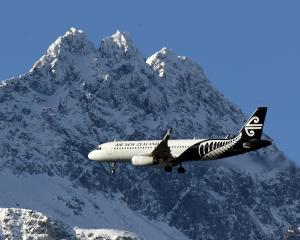
Plaza Investments Ltd took legal action against the Queenstown Lakes District Council after the Lakeside Motel, which the company owns, was damaged in 2014 when a century-old tree fell across Queenstown’s busy Lake Esplanade, crushing seven cars.
There were high winds at the time but the fallen tree was found to have white rot, which weakened it. The company alleged the council was negligent by not conducting invasive tests on a row of Lombardy poplars at the park and not identifying the fallen tree was riddled with white rot.
Losses of $63,578, plus interest and costs, were sought from the council.
But Judge John Hassan dismissed the claim after a three-day hearing in the Queenstown District Court this week.
The Otago Daily Times was not in court for the judge’s oral judgement yesterday.
Council lawyer Nick Whittington, of Auckland firm Meredith Connell, said last night the judge found the council did owe a duty of care to the motel owner, but it had not breached that duty because it had acted reasonably by taking the appropriate expert advice and following that advice.
Costs were reserved.
On Wednesday, Plaza Investments counsel Lorraine MacDonald, of Auckland firm Kennedys, said the council failed to institute a felling and replacement programme for the trees, as suggested by an arborist in 2005.
The council was aware, through several arborist reports dating back to 2005, that there was decay in many of the poplars, she said.
"Once it was aware of the decay, in such a high-hazard tree, it was incumbent on it to check the progress of the decay."
On Thursday, Mr Whittington said that is exactly what the council did.
"The council’s monitoring regime was reasonable. It was based on expert advice. It was regularly implemented by qualified arborists.
"The experts consistently advised the council that the tree that subsequently fell was healthy at the time of each inspection."
Plaza Investments witness Robin Wakeling, a wood decay expert, said visual inspections used by arborists were not reliable and the council should have carried out internal testing.
A 2005 report on the St Omer Park trees, written by arborist Iain Mackinnon, was commissioned by the council after a 30m poplar fell in high winds the previous year.
The report said the poplars were "coming to the end of their lives" and recommended a "phased felling plan" be implemented.
At the time, he recommended full inspections of the trees by qualified arborists every year to 18 months.
In evidence given via videolink from Tauranga on Thursday, Mr Mackinnon said the 2005 recommendation was for visual inspections.
"I was not suggesting any test should be invasive."
Another arborist report, from 2007, said the Lombardy poplars should be monitored annually to detect "further signs of decay and/or decline".
The 2007 report assessed the tree that fell in 2014 as being in "good condition" at the time.
Arborist consultant and trainer Mark Roberts, a Plaza Investments witness, told Judge Hassan visual assessments were "only a part of a process" — and he would not write a report based on a visual assessment alone.
Question-marks have hung over the health of ageing poplars in the Wakatipu Basin for years.
They were heightened in 2009 when farmer Russell Liggett was killed when a 20m poplar fell on his Toyota Hilux near his home on Lower Shotover Rd.
The council removed more than 60 trees in the area the following year.
Mr Roberts told the court this week he would be "doubly concerned" about the St Omer Park poplars, considering those in Lower Shotover Rd were the same species, roughly the same age and had similar growing conditions.
The council’s current arborist, Tim Errington, gave evidence that the council would normally follow the recommendation of experts to remove unsafe trees.











